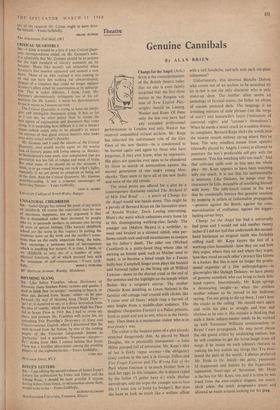Theatre
Genuine Cannibals
By ALAN BRIEN
of the British theatre today
that no one is even faintly surprised that the first three names in the Penguin vol-
ume of New English Play- wrights should be Lessing,
Wesker and Kops. Of these only the last two have had any extended professional performances in London and only Wesker has received unqualified critical acclaim. Mr. Kops has inherited the unfortunate role of the Guy Faux of the new theatre—he is condemned to be burned again and again by those who have forgotten, if they ever knew, what he represents. His plays are quarries ever open to be plundered by those in search of ammunition against the second generation of our angry young Men- sheviks. They seem to have all of the new faults and none of the old virtues.
'The usual prizes are offered for a plot by a contemporary dramatist entitled The Richard II of Mile End Road' . . . a précis of Change for the Angel would win hands down. This might be a parody of Bernard Kops on the formative years of Arnold Wesker, Doris Lessing intervening. Mum's the word which unbuttons every loose lip in this disintegrating working-class family. The younger son (Melvin Hayes) is a scribbler, as weak and bruised as a skinned rabbit, who per- forms occult rock-and-roll incantations to conjure up his father's death. The elder son (Michael Crawford) is a putty-faced thug whose idea of earning an honest quid, such as Mother used to make, is to become a hired tough for a Fascist bully-boy. Campbell Singer even plays the boozed and battered father as the living spit of Wilfred Lawson—down to the slurred creak at the end of the sentence and the highlight on the temple which flashes like a surgeon's mirror. The mother (Natalie Kent doubling as Gwen Nelson) is the familiar old cottage loaf crusted with clichés like 'I come over all funny' which reap a harvest of easy laughs from a middle-class audience. The daughter (Jacqueline Forster) is a Palais princess, fresh as paint and just as wet, who is in the family way. Then there is a mysterious visitor who is in everybody's way.
The visitor is the weakest point of a plot already stretched dangerously thin. As played by Hazel Douglas, she is practically transparent—a Joan Miller pumped full of novocaine. Mr. Kops's idea of her is fairly vague anyway—the obligatory crazy cuckoo in the nest a la George Dillon and Five Finger Exercise and The Wrong Side of the Park whose function is to teach Mother how to suck her eggs. In this instance, she is almost raped by the father ('I gotter have it') while Mother eavesdrops, and she urges the younger son to face life ('I want you to build by bridges'). But does she have to look so much like a welfare officer
with a sick headache, and talk with such cut-glass refinement?
Unfortunately, this inverted Blanche Dubois who comes out of an asylum to be assaulted by an in-law is not the only character who is only make-up deep. The mother often seems an anthology of farcical mums, the father an album of seaside postcard dads. The language is an irritating mixture of stale phrases ('on the verge of tears') and housewife's Joyce ('restitution of convivial rights' and 'coroner's thrombosis'). When he needs a smart crack or a sudden drama- tic complaint, Bernard Kops sticks the words into the nearest mouth without caring where they've been. The sexy mindless mouse from upstairs (shrewdly played by Angela Crowe) is allowed to puncture the boy's predictable self-pity with the comment, 'You bin watching telly too much.' And that criticism spills over to bite into the whole play—Mr. Kops appears to have been watching telly too much. It is not that his sentimentality is insincere. Like Dickens, he weeps over the characters he kills, incapable of insulating himself with irony. The telly-touch comes in the way that he continually betrays this genuine emotion by popping in pellets of fashionable propaganda —protests against the Bomb, against the com- mercialisation of craftsmen, against the nigger- baiting corner boys.
Change for the Angel has had a universally bad press and 1 would not add another twenty inches if I did not feel that underneath this second- hand burlesque an original talefit was foolishly stifling itself. Mr. Kops knows the feel of a working-class household—iow they eat and how they argue, where they eat and where they argue, how they tread on each other's privacy like kittens in a basket. But this is now no longer the profes- sional expertise of a few anthropologists—in playwrights like Shelagh Delaney, we have plenty of genuine cannibals who can bring us back first- hand reports. Intermittently, Mr. Kops springs a devastating insight—as when the stricken mother refuses to be moved to her bedroom saying, 'I'm not going to die up there, I can't bear the cracks in the ceiling.' He should start again and write his play as straight and true and obvious as he sees it. His mistake is thinking that such a basic subject-matter needs to be worked up with Tennessee Williams sensationalism or Royal Court propaganda. He may never please the old guard critics by unshirking realism, but he will continue to get the horse-laugh from all wings if he insists on such adman's rhetoric as making his boy author say things like 'I've swal- lowed the pain of the world.' I always preferred Mr. Hyde to Dr. Jekyll—the gutsy, passionate Suppressed iippressed and hidden by the hypocritical, squeamish Super-ego of Stevenson. Mr. Hyde is the boy for Mr. Kops, too, and it is time he was freed from the over-explicit slogans, the smart- aleck jokes, the stock progressive poses and allowed to roam around looking for his prey.










































 Previous page
Previous page